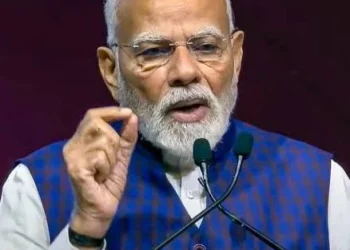A decorated Green Beret’s tragic final act shocks the nation: Matthew Livelsberger, 37, staged a fiery explosion outside Trump International Hotel in Las Vegas on New Year’s Day. His suicide, paired with impassioned notes calling for a national “wake-up call,” reveals a haunting struggle with PTSD and disillusionment. Dive into the complexities of his story, from his military heroism to his final plea for change.
BY PC Bureau
The highly decorated Green Beret, Matthew Livelsberger, 37, who took his life inside a Tesla Cybertruck just moments before the vehicle exploded outside the Trump International Hotel in Las Vegas, left notes describing the event as a “wake-up call” for America, aimed at drawing attention to societal and political issues plaguing the nation.
Livelsberger, a veteran of the U.S. Army since 2006, served two tours in Afghanistan and had been deployed to several global hotspots, including Ukraine and Congo. In notes recovered from his cellphone, he expressed deep personal anguish over his military experiences and his frustration with societal apathy.
<blockquote class=”twitter-tweet”><p lang=”en” dir=”ltr”>Report: Matthew Livelsberger’s wife left him days before Tesla Cybertruck explosion<a href=”https://t.co/25zmk08VNx”>https://t.co/25zmk08VNx</a> <a href=”https://t.co/IrXaQZe8nT”>pic.twitter.com/IrXaQZe8nT</a></p>— The Washington Times (@WashTimes) <a href=”https://twitter.com/WashTimes/status/1875060304079401428?ref_src=twsrc%5Etfw”>January 3, 2025</a></blockquote> <script async src=”https://platform.twitter.com/widgets.js” charset=”utf-8″></script>
“This was not a terrorist attack,” Livelsberger wrote. “It was a wakeup call. Americans only pay attention to spectacles and violence. What better way to get my point across than a stunt with fireworks and explosives?”
A Soldier’s Struggles
Livelsberger’s writings reflected a man grappling with profound trauma and disillusionment. He spoke of needing to “cleanse” his mind of the comrades he lost and the burden of lives he took during combat. His letters spanned topics ranging from political grievances to international conflicts, including the war in Ukraine, and described the U.S. as “terminally ill and headed toward collapse.”
LVMPD has released messages found on the cell phone of Matthew Livelsberger, the driver of the Tesla Cybertruck that exploded outside the Trump Las Vegas on Jan 1. pic.twitter.com/Hx7RkY8pSy
— Las Vegas Locally 🌴 (@LasVegasLocally) January 3, 2025
According to media reports, former girlfriend Alicia Arritt, an Army nurse, disclosed that Livelsberger suffered from significant pain and exhaustion, which she attributed to traumatic brain injury. “My life has been a personal hell,” he told Arritt in text messages, citing relentless physical pain and haunting memories from his deployments.
A Solemn Stunt
The explosion, which injured seven people but caused minimal damage to the Trump International Hotel, was executed with precision, involving fireworks and camp fuel. Authorities confirmed Livelsberger acted alone and harbored no ill will toward President-elect Donald Trump. In fact, one note urged Americans to “rally around” Trump and Tesla CEO Elon Musk, whom Livelsberger admired. Neither Trump nor Musk was in Las Vegas at the time of the explosion.
Tesla engineers assisted in the investigation by extracting data from the Cybertruck, including Livelsberger’s travel path from Colorado to Las Vegas. Investigators continue to analyze a trove of data, including videos, documents, and web history, to fully understand his motives.
A Distinguished Career
Livelsberger’s military accolades were numerous. He earned five Bronze Stars—one with a valor device for courage under fire—along with an Army Commendation Medal and a Combat Infantry Badge. Recently returned from an overseas assignment in Germany, he was on approved leave at the time of his death.
Despite his decorated service, Livelsberger’s life was marked by personal turmoil. Neighbors in his Colorado Springs community described him as a seemingly “normal guy” with a wife and young child, making his actions all the more shocking.
Broader Implications
The explosion drew comparisons to another New Year’s Day tragedy in New Orleans, where a man rammed a truck into a crowd, killing 14. While that incident is being investigated as a terrorist attack, Livelsberger’s act is viewed as a complex case of suicide rooted in mental health struggles.
“This appears to be a tragic case of a combat veteran struggling with PTSD and other issues,” said Spencer Evans, FBI special agent in charge in Las Vegas.
Livelsberger’s death has reignited conversations about veteran mental health and the need for robust support systems. It also serves as a somber reminder of the weight many service members carry long after their tours of duty end.
While Livelsberger’s final act was both public and sensational, its ultimate legacy may lie in the painful questions it raises about a nation’s responsibility to its heroes.













